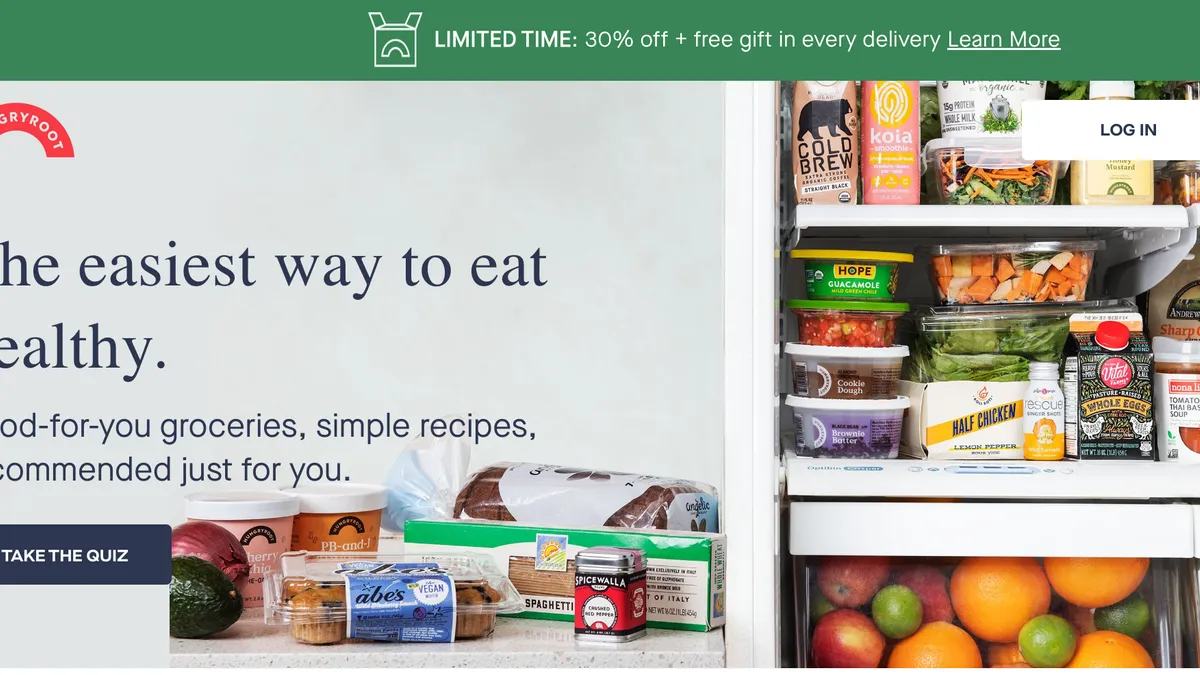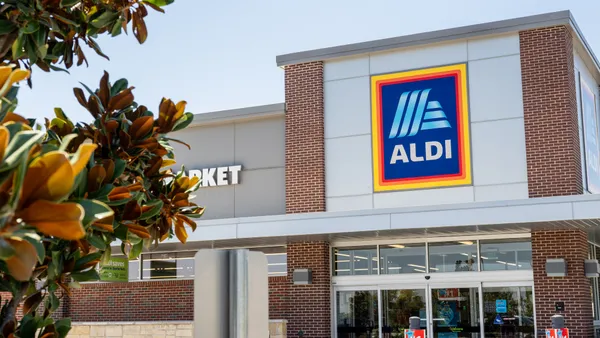Dive Brief:
- E-grocer Hungryroot posted 35% growth in the first quarter atop 142% net revenue growth in 2021, according to a news release issued on Monday.
- That growth tracks the company’s expansion as it has added more products, hired new executives and stepped up promotional activity for its personalized shopping engine. Hungryroot now carries 450 products and plans to offer around 1,500 within the next few years, founder and CEO Ben McKean said in an interview.
- Hungryroot is trying to thrive in a challenging environment for online-only grocers, with sales from ship-to-home food retailers in May down 16% over the same month a year ago, according to the latest online grocery survey from Brick Meets Click and Mercatus.
Dive Insight:
Pure play online grocers face a litany of challenges right now, from hesitant investors to rising inflation and stiff competition from brick-and-mortar stores. Many of these startups saw their sales balloon early in the pandemic only to see them fall off sharply after people returned to in-store shopping en masse.
According to the latest online grocery sales report from Brick Meets Click and Mercatus, sales for ship-to-home grocery services totaled $1.4 billion in May, down from $1.7 billion during the same month last year. Average order value for these services declined 10%, though the base of active monthly users increased by 9%, the firms’ survey found.
Amid this turbulent environment, Hungryroot says it’s growing and building a sustainable business. McKean declined to say how many users it currently has, but he said the company is focused on bringing in new members while also deepening engagement among existing ones. Hungryroot has expanded its marketing efforts, buying TV spots while also sending out direct mailers and turning to influencers to hype the brand.
The e-grocer is also refining the engine powering its personalized shopping experience. Unlike most other digital grocers, Hungryroot doesn’t require users to shop its virtual aisles and add items to their cart. It populates weekly grocery lists and meal plans for members, who can then make swaps as they see fit before finalizing delivery.
This process, which inverts the traditional grocery shopping experience, is initially based on an intake questionnaire that users complete when they sign up. After that, Hungryroot employs machine learning to craft better and better lists based on what users buy and what they tell the company they like and don’t like in short, follow-up questionnaires. In an interview earlier this year, Chief Digital Officer Alex Weinstein said Hungryroot tries to send targeted follow-up surveys, with the hope that the data it collects will help improve accuracy and ultimately save users time.
Hungryroot said it plans to expand its machine learning capabilities “to collect more actionable feedback and improve accuracy.” It also plans to offer lunch options and a “weekly staples” plan that automatically sends users products they use every week, along with roll out more nutrition labeling tags.
At a time when many consumers are still hesitant to let a human shopper pick their groceries, asking them to trust an algorithm stands as a clear challenge to widespread acceptance of Hungryroot’s model. McKean, in response, emphasized the service’s time-saving benefits: With pre-filled lists, shoppers spend just a few minutes “shopping” each week. He also emphasized the accuracy of Hungryroot’s model, with members currently accepting 72% of the items that get pushed to them. The company hopes to eventually push that percentage up to 90%.
Another potential barrier is price. Online grocers like Hungryroot tend to serve an affluent consumer base, but even moneyed shoppers may be feeling the pinch of record-high inflation and gas prices. McKean said Hungryroot can tailor recommendations for cost-conscious shoppers — by recommending fresh chicken for users to cook instead of a more expensive cooked chicken, for example.
To facilitate its expansion, the company has been adding new leadership, including Chief Financial Officer Wajeeha Ahmed, who was previously CFO of Barstool Sports, and Mike Lorenzen, vice president of analytics and strategic insights, who recently held similar roles at Kayak and DoorDash. Hungryroot has also added new board members, including Mindy Grossman, former President and CEO of WW, and Mark Nelson, the former CFO and Chie Operating Officer of Beyond Meat.
McKean hinted that Hungryroot may be gearing up to go public at some point — “We believe that the public markets are part of our future” — but declined to say if the company has a timeline in mind.
“We are very much in growth mode,” he said.










